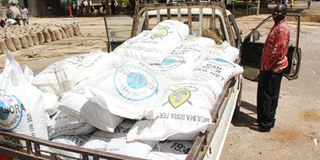Farmers ignore advice to ditch DAP fertiliser

A farmer prepares to leave with bags of fertilizer from the National Cereals and Produce Board, Eldoret depot on January 21, 2014. Farmers in North Rift are reluctant to stop using DAP fertiliser despite a decline in maize output due to increased soil acidity attributed to prolonged application of their preferred input. PHOTO/FILE
What you need to know:
- The grain farmers yesterday dismissed a government report on soil analysis that recommends Single Super Phosphate (SSP), Nitrogen Phosphate (NPK) and Mavuno, and blames use of Di-Ammonium Phosphate (DAP) for poor harvests.
- A study by the Kenya Agricultural Research Institute indicates that soil acidity level in the region ranges from slight to strong and recommend SSP and NPK for cultivation of maize.
Farmers in North Rift are reluctant to stop using DAP fertiliser despite a decline in maize output due to increased soil acidity attributed to prolonged application of their preferred input.
Experts estimate that they are losing about 10 bags of maize per acre annually due to soil acidity.
The grain farmers yesterday dismissed a government report on soil analysis that recommends Single Super Phosphate (SSP), Nitrogen Phosphate (NPK) and Mavuno, and blames use of Di-Ammonium Phosphate (DAP) for poor harvests.
“For a long period, DAP has proved suitable for our crops and we have no reason to change to other varieties of fertiliser,” said Mr Jackson Kipkosgei Too from Moiben in Uasin Gishu County.
REDUCED OUTPUT
But a study by the Kenya Agricultural Research Institute indicates that soil acidity level in the region ranges from slight to strong and recommend SSP and NPK for cultivation of maize.
“Maize production in the region has dropped from 30 to 20 bags per acre as soil continues to lose its fertility due to an increased acidity level, subjecting farmers to low returns,” said agriculturalist Mathew Lang’at.
The National Cereals and Produce Board said DAP is in short supply. It further said that it has imported more fertiliser of the other varieties for this planting season.
The board has 230,000 bags of DAP and more than 500,000 bags of other varieties.
“Most of the DAP fertiliser has already been sold to farmers and they are waiting to collect it,” said the board’s public relations manager Evans Wasike.
He said more than 744,000 tonnes of NPK had been imported to improve availability of the nutrients to farmers to increase acreage under crop production.
WHAT’S AT STAKE
Drive on right inputs launched
The cereals board has launched a drive to advise farmers to purchase recommended subsidised fertiliser according to soil acidity level in their regions.
The board’s senior officials will hold agricultural field days in Uasin Gishu and Trans-Nzoia counties to encourage growers to buy fertiliser for this planting season.





